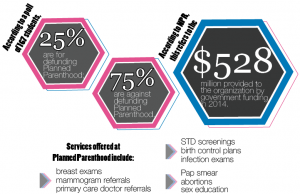Planned Parenthood

Under fire for issues regarding abortion services, Planned Parenthood, a reproductive health organization, is facing a demand for defunding.
For some, Planned Parenthood is a retroactive solution associated with shame and regret. However, for Rory Smith, sophomore, Planned Parenthood provides easily accessible and necessary care.
Until about a month ago, Smith suffered from severe menstrual cramps. After confiding in her parents and receiving a recommendation from her doctor, she agreed that taking birth control was the best solution to relieve her discomfort and purchasing it at Planned Parenthood was cheaper than a prescription from her primary doctor.
“Planned Parenthood (is the most affordable way) for me to take the medicine that I need to live a pain-free life,” Smith said.
April Dull*, junior, also decided to purchase birth control from Planned Parenthood with the support of her mother.
“My doctor diagnosed me with endometriosis after I had been in severe pain, and she gave me the option of getting birth control from her or Planned Parenthood,” Dull said. “My mom wanted to support Planned Parenthood, and it’s significantly more affordable for my family, so we went with Planned Parenthood.”
After using birth control for one year as purely an analgesic medication, Dull made the decision to become sexually active, and as such, the medication became a preventative measure to avoid pregnancy.
Olivia Saad, a close friend of Dull’s, believes that the services that Planned Parenthood provides, such as pregnancy prevention, are extremely valuable.
“(Teenagers) need to know about the dangers that go along with sex …there are ways to prevent those dangers,” Saad said. “Planned Parenthood is very preemptive, so you can be proactive about it.”
Although Austin Tapola, senior, takes issue with some aspects of Planned Parenthood, he can understand the value of the services it provides.
“While I’m not for premarital sex, I find that it’s good (Planned Parenthood) is providing birth control anyways,” Austin said. Additionally, he sees the value in the existence of the clinics “in case something like an STD comes up (so that) people still know where to go and and they have resources available for them.”
Angela Todd, a nurse practitioner at a Planned Parenthood affiliate in Sonoma, California, has firsthand experience with the extensive resources the facility offers.
“I see mostly women who are interested in starting or continuing their method of birth control, as well as women or men who would like screening for sexually transmitted infections,” Todd said. “(I also see) men and women who think they might have symptoms of an infection and want an exam.”
Although Planned Parenthood clinics provide a wide range of services, many people are unable to overlook one service in particular: abortions.
Jordan Tapola, senior, feels that the practice of abortion undermines any other value of the organization.
“Planned Parenthood does a lot of good stuff … with all the medical treatments for women and everything,” Jordan said. “But I can’t morally reconcile that with how they perform abortions and are potentially selling the fetal tissue.”
This sentiment, in addition to recent videos released by the Center for Medical Progress as part of their “Human Capital” project, has catalyzed a movement to revoke any government funding Planned Parenthood receives.
According to their website, “The Human Capital project is a 30-month-long investigative journalism study by The Center for Medical Progress, documenting how Planned Parenthood sells the body parts of aborted babies.” The most prominent portion of this project in the public eye has been their graphic undercover videos featuring actors posing as scientists looking to receive fetal tissue donations for research.
The controversy is a result of the exchange of money in conjunction with the donation of the fetal tissue. 42 U.S. Code 289g-2 states that the selling of fetal tissue is illegal, although women are allowed to donate fetal tissue after an abortion, according to the National Institutes of Health Revitalization Act of 1993.
The law prohibits “valuable consideration” for fetal tissue donations, however “valuable consideration does not include reasonable payments associated with the transportation, implantation, processing, preservation, quality control, or storage of human fetal tissue.”
In the videos, the actors and Planned Parenthood representatives are seen haggling over what the cost of a single, intact aborted specimen would be considered reasonable to satisfy both the clinic and the faux buyer.
There is confusion regarding what exactly crosses the line from legal to illegal activity, even from within Planned Parenthood. In one of the videos released by the Center for Medical Progress, a Planned Parenthood representative says to the researcher “we’re not in it for the money, and we don’t want to be in a position of being accused of selling tissue, and stuff like that. On the other hand, there are costs associated with the use of our space.”
It is this paradox, coupled with the alarming undercover videos that depict the dismembering of fetal tissue, that have led to the movement to defund Planned Parenthood.
Austin Tapola is part of the popular movement to defund Planned Parenthood due to his strong belief in the immorality of abortion and the subsequent donation of tissue.
“Life is sacred from the point of conception, so therefore it’s against any sort of morals to be killing a fetus because it still has a life of its own and deserves to be protected,” Austin said.
Many students are troubled by the fact the government is supplying millions of dollars to an organization that performs abortions. Planned Parenthood maintains that only three percent of all health services offered at the clinic are abortion related.
If the proposed defunding of Planned Parenthood were to occur, it would affect thousands of people who attend the clinic for reasons other than abortion.
According to Todd, “Patients come in to see me who haven’t had any medical care in 20 years, and I can set them up with a Pap smear, breast exam, mammogram referral, referral to a primary care doctor, dentist, therapist, draw their blood and check for high cholesterol or diabetes and educate them on birth control and safe sex or on what they can do to ready themselves to have a baby if they are seeking pregnancy. If we were defunded it would be much more difficult to provide these great services to our patients.”
Todd defends Planned Parenthood in saying that the clinic, “is striving to lower abortion rates by lowering the rates of unplanned pregnancies through education and birth control services.” According to Planned Parenthood, the “estimated number of abortions averted by (the clinic’s) contraceptive services each year is 216,000.”
Based on last year’s reported numbers, the potential defunding and revoking of federal money would decrease Planned Parenthood’s revenue by $528 million.
Saad concurs that the defunding of Planned Parenthood would leave great repercussions. For those strongly opposed to Planned Parenthood and the services it provides, she requests them to be a more receptive audience. “It’s not the same for everyone. There are millions of other people who don’t believe the same thing and who are in completely different situations than you are. Open mindedness is key.”
Austin agrees with the necessity for a widespread discussion about the practices of Planned Parenthood.
“(People) should bring a dialogue about it … there should be some sort of conversation between the legislatures … and the people,” Austin said.




